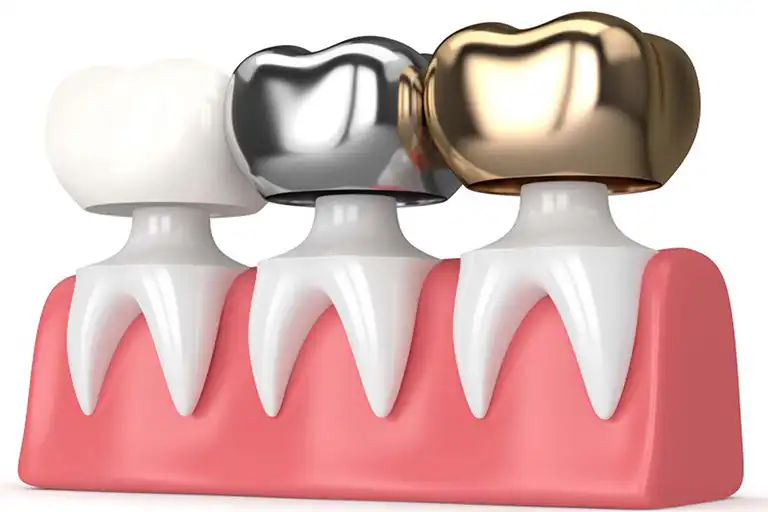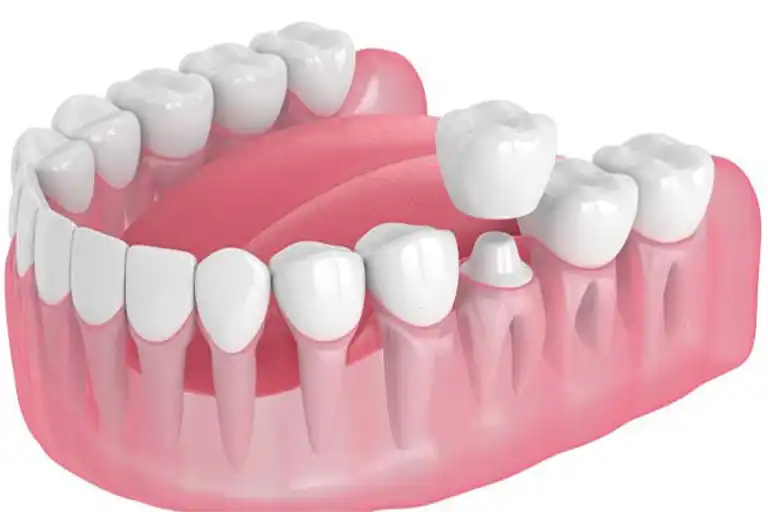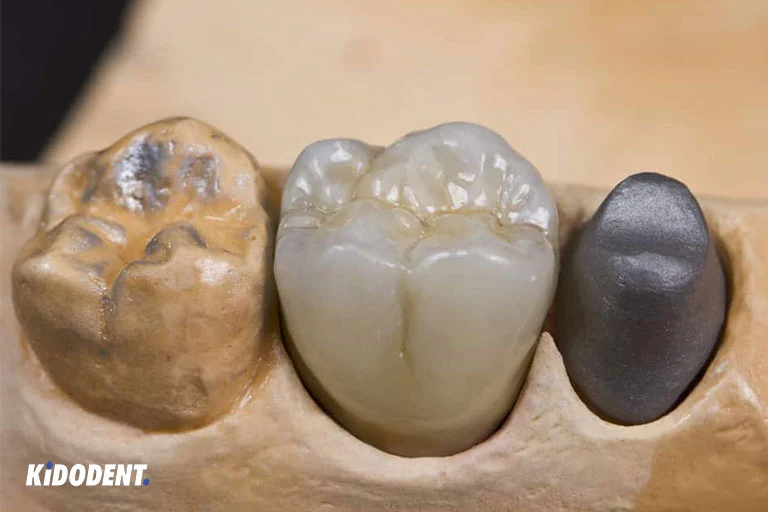A crown is a prosthetic cap cemented on top of a person’s tooth that has been too badly damaged. They are usually needed when a tooth is so weakened that a filling cannot fix the issue. Now that your dentist recommends that you need a dental crown, some questions begin to come to your mind: What type of dental crown is best for me? Which ones look natural and make my smile beautiful? Or How long do they last? This article will help you understand different types of dental crowns, comparing the benefits, drawbacks, and costs of each type.
What are dental crowns?
Dental crowns are tooth-shaped and custom-made caps placed over your damaged existing tooth or a dental implant. They are typically used when you experience extensive damage to your tooth. So, you may require a crown to cap your damaged, decayed, cracked, or broken tooth, or to cover up a discolored tooth entirely. Also, your dentist will use a crown to protect your teeth from further damage after a root canal treatment. If you have had a dental implant, be informed that the upper part of your dental implant is capped with a crown.
Once placed, crowns restore your tooth to its normal, natural shape, improving the appearance and function of your teeth.
Crowns have both restorative and cosmetic purposes which enhance your smile look significantly.
Dental crowns procedure: what to expect?
Generally, a dental crown procedure involves two visits unless it is a same-day crown prepared in the dentist’s office.
- Step 1: During the first visit, your dentist examines the tooth which is about to receive the crown. X-rays are taken and the tooth is checked for any sign of decay or pulp infection.
- Step 2: The dentist files down and trims the tooth from all outer sides to make room for the crown to fit. Next, an impression (mold) of your trimmed tooth and other teeth above and near is taken. The impression will be sent to the lab to prepare your permanent crown. This can take one week or several weeks.
- Step 3: In the second visit, your dentist will remove the temporary crown—which you used to cover the prepared tooth—and cement your permanent crown in place.

What are the different types of dental crowns?
There are several options when it comes to choosing a dental crown material. Some of them offer a tooth-colored natural look, while others provide you with better durability.
1. Porcelain crowns (all-ceramic)
Porcelain crowns offer one of the most natural looks that match the surrounding teeth in the best way. They are one of the most popular options due to their great aesthetics. Porcelain is a type of glass ceramic, so they are also called all-ceramic or just ceramic crowns.
Pros:
- Most natural looking and best tooth-color appearance
- Most beautiful crown: reflect light (translucence) as real enamel does
- Best to restore front teeth
- Biocompatible, meaning no metal is used and no worries about allergies
Cons:
- Although can be durable, not as strong as other options like metal or other ceramics like zirconia
- More prone to chipping and wear under pressure, making them not an ideal option for back teeth or with teeth grinding habits
- Potential wear on adjacent teeth
- More tooth reduction in order to make it thicker thus preventing breakage
- Can cost more
2. Porcelain-Fused-to-Metal (PFM)
Porcelain-Fused-to-Metal crown is made of both metal for its base inside and porcelain which covers the exterior part of the crown. This makes a good combination of the strength of metal and the aesthetics of porcelain. They are also a widely used types of dental crowns.
Pros:
- Aesthetic and good appearance:
- Very strong and durable
- Great on a back tooth
Cons:
- Lack the aesthetics of all porcelain and other ceramic crowns due to its metal portion
- Has an opaque and gray metal color near the gum line which darkens if there is receding gum problems
- Requires more removal (1.5 mm) of tooth structure to place
3. Gold
Gold is a more classical type of crown and has been chosen because of its durability and strength. In fact, dentists call it the wonderful gold standard of all the crowns. It lasts the longest and protects your tooth at its best. One thing that gold crowns don’t have is aesthetics. Because of its color, gold does not make a good choice for visible front teeth.
Pros:
- Strongest and the most long-lasting of all the dental crown types
- Least reduction and drilling of the natural tooth. So, it helps preserve healthy tooth structure.
- Doesn’t break or fracture
- Provides the best fit over on the margins for your tooth, thus preventing bacteria to get into the pulp or causing leakage
- Very gentle on opposing teeth
Cons:
- Doesn’t look like a natural tooth
- Not an option for front teeth due to its poor aesthetics and color
- Higher price
4. Zirconia
Zirconia is made of zirconium dioxide, a new type of ceramic material crown in dentistry. Not only is the zirconia crown incredibly long-lasting and durable, but it provides a very pleasing tooth-color appearance.
Pros:
- Most pleasing esthetically and offers a great natural appearance
- Tough and very strong and less likely to chip or break
- Biocompatible: metal-free, so no concern if you have metal allergies
- Same-day procedure: The crown is digitally designed and made using computer-aided design/manufacturing (CAD/CAM) technology in a single visit, so no need to send the impression to the lab.
Cons:
- Can cause friction to adjacent teeth. It can wear down neighboring teeth enamel.
- More tooth reduction
- Higher cost
5. Metal
Metal is among the strongest types of dental crowns you can choose along with gold alloy. They are made of a base metal alloy, palladium alloy, nickel, sliver, or sometimes amalgam alloy. Metal is not your choice if you are looking for something natural that improves your smile. Usually, they are used for out-of-sight teeth. However, if aesthetics is not your concern, you will have a great protection for your tooth for many years with that.
Pros:
- Very long lasting and strongest crown (besides gold)
- Doesn’t fracture and are highly durable and corrosion-resistant
- Gentle on the opposite teeth
- The least amount of natural tooth needs to be removed
Cons:
- Doesn’t look natural and it is not esthetically pleasing. When you speak or smile, the metal visibility looks artificial.
- Not an option for people with metal allergies
6. E-Max: Lithium disilicate
Made of lithium disilicate, a highly esthetic all-ceramic, E-Max is the newest type of dental crown. This same-day crown is prepared using CAD/CAM technology (computer-aided design/manufacturing). Plus, they are superior for their transparent natural color and provide an exact color match with a person’s teeth.
Pros:
- Highly esthetic and great natural color that best blend with teeth
- Strong and durable
- Same-day placement
- Great fracture resistant and less prone to chipping
Cons:
- Expensive
- Not as strong as other tooth-colored ceramic crowns like zirconia

Which dental crowns last the longest?
Gold lasts the longest among the dental crowns followed by metal, zirconia, and Porcelain-Fused-to-Metal, which are among the most durable dental crowns. With proper care, they can last more than 15 to 20 years.
On average, most dental crowns can last anywhere from 5 to 15 years. The lifespan of a crown depends on what type of material you choose, how well it is made by your dentist or the lab technician, and, of course, how you will take care of it. Here is the table showing the durability of each one:
| Crown Type | Average Longevity | Strength |
| Porcelain (ceramic crowns) | 5-15 years | Medium |
| Porcelain Fused Metal (PFM) | 15-20 years | High |
| Gold | Decades | Very High |
| Zirconia | 15-20 years | High |
| Metal | More than 20 years | High |
| E-Max | 10-15 years | Medium to High |
How much do dental crowns cost?
In general, dental crowns can range in price from $800 to $1,500 or even higher. The cost really depends on the materials used, the size of the tooth, the location of the dentist, and whether or not you have insurance.
Additionally, your overall costs can rise if you need more procedures before placing the crown. You may require a root canal or a dental implant, in which your total price will increase.
The table below shows the price of different types of dental crowns in the United States:
| Crown Type | Cost per tooth in the USA |
| Porcelain (ceramic crowns) | $800-$3,000 |
| Porcelain Fused Metal (PFM) | $500-$1,400 |
| Gold | $600-$2,500 |
| Zirconia | $1,000-$2,500 |
| Metal | $800-$2,500 |
| E-Max | $1,200-$1,800 |
How much do dental crowns cost with insurance?
Generally, dental insurance covers 50% of the crown price if your procedure is for medical reasons. Since a dental crown is usually considered cosmetic, insurance doesn’t cover it. So, expect to pay the total fee out of pocket.
However, you should first check your insurance provider on coverage plans. You can get your dental billing company to help you save up on services and make sure you will be reimbursed. And be sure whether the dentist you are visiting accepts insurance.
